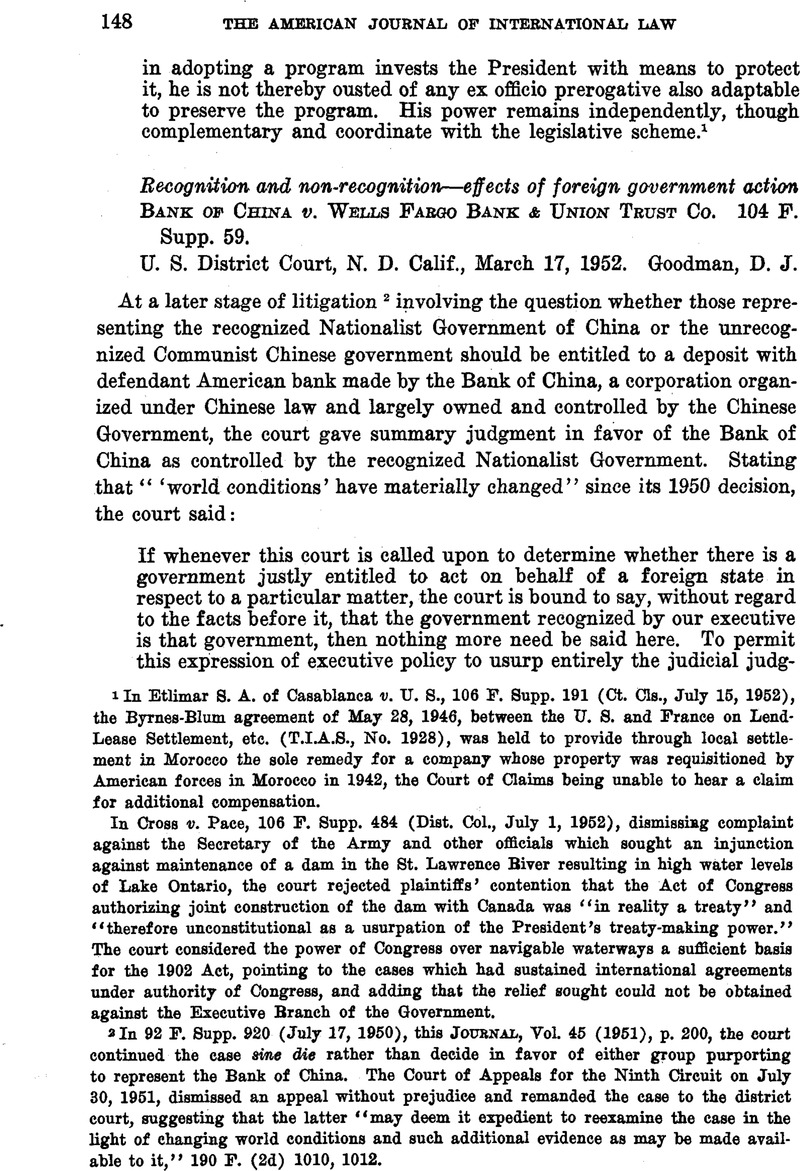No CrossRef data available.
Article contents
Bank of China v. Wells Fargo Bank & Union Trust Co.
Published online by Cambridge University Press: 20 April 2017
Abstract

- Type
- Judicial Decisions Involving Questions of International Law
- Information
- Copyright
- Copyright © American Society of International Law 1953
References
1 In Etlimar S. A. of Casablanca v. U. S., 106 F. Supp. 191 (Ct. Cls., July 15, 1952), the Byrnes-Blum agreement of May 28, 1946, between the U. S. and France on Lend-Lease Settlement, etc. (T.I.A.S., No. 1928), was held to provide through local settlement in Morocco the sole remedy for a company whose property was requisitioned by American forces in Morocco in 1942, the Court of Claims being unable to hear a claim for additional compensation.
In Cross v. Pace, 106 F. Supp. 484 (Dist. Col., July 1, 1952), dismissing complaint against the Secretary of the Army and other officials which sought an injunction against maintenance of a dam in the St. Lawrence River resulting in high water levels of Lake Ontario, the court rejected plaintiffs’ contention that the Act of Congress authorizing joint construction of the dam with Canada was “in reality a treaty” and “therefore unconstitutional as a usurpation of the President’s treaty-making power.” The court considered the power of Congress over navigable waterways a sufficient basis for the 1902 Act, pointing to the cases which had sustained international agreements under authority of Congress, and adding that the relief sought could not be obtained against the Executive Branch of the Government.
2 In 92 F. Supp. 920 (July 17, 1950), this Journal, Vol. 45 (1951), p. 200, the court continued the case sine die rather than decide in favor of either group purporting to represent the Bank of China. The Court of Appeals for the Ninth Circuit on July 30, 1951, dismissed an appeal without prejudice and remanded the case to the district court, suggesting that the latter “may deem it expedient to reexamine the case in the light of changing world conditions and such additional evidence as may be made available to it,” 190 F. (2d) 1010, 1012.
3 This Journal, Vol. 36 (1942), p. 309.
4 Referring to the Kellogg-Briand Treaty of 1928, to which both the United States and the U.S.S.R. were parties.
5 In Republic of China v. American Express Co., 195 F. (2d) 230 (Ct. App. 2nd Ct., Feb. 4, 1952), suit was brought by the Nationalist Government of China to recover a deposit with defendant, which successfully interpleaded on the ground that the Communist government of China had laid claim to the deposit. Plaintiff was unsuccessful in its attempt to appeal from the interpleader order, which merely required defendant to pay into court the money involved. The court held that sovereign immunity did not prevent interpleader against a government which originally came into court as plaintiff, nor did the alleged inability of the unrecognized Chinese government to sue prevent their having a possible claim sufficient to justify the interpleader proceedings.




